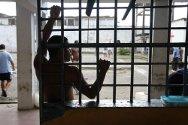The ICRC visits more than 70 detention facilities in Colombia to check that the conditions of detention comply with international humanitarian law and other minimum standards. The findings of those visits are shared with the authorities in confidence with a view to improving the detainees' situation. Extract from Colombia report 2011.
In accordance with its mandate, the ICRC regularly visits state detention facilities in Colombia. Having made 137 visits to 71 such facilities in 2011, the ICRC is a privileged observer of prison life and the problems faced by Colombia's prison population as a whole, and specifically by detainees imprisoned as a result of the conflict.
The goal of the ICRC's visits is to get an overview of the prison situation, to help improve detainees' conditions, to facilitate contact with their families, and to check that their treatment and the legal safeguards in place comply with international humanitarian law and other minimum standards recognized at the national and international levels.
The ICRC emphasizes the Colombian government's proposal to completely overhaul the prison system in order to dramatically improve the current situation in prisons. If this reform is planned and implemented carefully, incorporating the recommendations of civil-society organizations familiar with the issue, this could be an excellent opportunity to roll out a comprehensive detention policy that will make a real difference in prison life and foster respect for the rights of detainees.
Today it is well known that detainees endure overcrowded, difficult conditions. Their situation deteriorated further in 2011 owing to a rise in the prison population, which had direct repercussions on their quality of life.
Overcrowding deprives inmates of the minimum living space stipulated by international standards, as well as hampering their access to health care and water and exacerbating sanitary conditions. Overcrowding also jeopardizes the detainees' rehabilitation and reintegration prospects by limiting their study and employment opportunities, and is a major source of tensions and violence in prisons.
In many cases, being separated from their loved ones has an impact on detainees' state of mind. When they are transferred to prisons located far away from their places of origin, regular contact with their families becomes difficult. This loss of family ties also hinders their reintegration into society once they are released.
Efficient and timely access to specialized health-care services and medicines is still sorely lacking. This situation hits the most vulnerable detainees hardest, such as those with chronic illnesses, and pregnant women.
There is a lot of bitterness and resentment in prison
"Prison is a tough place to live because bitterness and resentment flourish in the difficult conditions. I have had some really bad days and my drug problem made things worse, but I was lucky enough to join a therapeutic community, where I rediscovered the will to live." Carlos Andrés, inmate at Bellavista prison in Medellín.
The ICRC's humanitarian responseWhat international humanitarian law has to say
ICRC study on customary international humanitarian law:
- Rule 118.Persons deprived of their liberty must be provided with adequate food, water, clothing, shelter and medical attention.
During their visits to detention facilities, ICRC delegates hold private interviews with detainees, in which they discuss their treatment and conditions of detention. As well as seeing the situation firsthand, they talk to the prison authorities and staff to get a better understanding of the problems encountered in the course of their duties.
The ICRC documents the problems and makes verbal and written recommendations that are shared with the authorities in confidence. The aim is to find effective, practical solutions through a constructive dialogue. In 2011, the ICRC paid regular visits to more than 4,700 detainees imprisoned in connection with the conflict and other armed violence in 71 prisons in Colombia. Some 2,700 detainees were monitored individually.
Over the course of 2011, the ICRC submitted 20 reports to prison authorities setting out the findings and recommendations resulting from its visits. Those reports brought about specific improvements for all the inmates of the prisons visited. Numerous other cases of detainees whose health or safety was a cause of concern for the ICRC were monitored through individual verbal and written representations.
The ICRC submitted detailed recommendations to the authorities regarding the reform of the penal code and organized a round-table meeting at which civil-society organizations with expertise in this field put forward their proposals.
The ICRC also called a meeting of experts from the Ministry of Justice and the National Prison Institute to discuss the standards governing the planning and construction of new detention facilities and the maintenance of prison systems and services.
An assessment of the prison health-care system nationwide was carried out by the ICRC, including an in-depth look at two detention facilities in particular. This led to a series of recommendations being addressed to the national and regional authorities. The ICRC also worked with national and international organizations on key health issues, such as preventing and treating tuberculosis and caring for mentally ill detainees. Training on health and hygiene issues was given to 18 staff members from the National Prison Institute who work in 13 detention facilities. They passed on what they had learnt to inmates, who then became a driving force for better health practices in the prisons. In this way, 258 detainees received training in 2011.
